Samsung SSD 840 EVO mSATA (120GB, 250GB, 500GB & 1TB) Review
by Kristian Vättö on January 9, 2014 1:35 PM ESTRandom Read/Write Speed
The four corners of SSD performance are as follows: random read, random write, sequential read and sequential write speed. Random accesses are generally small in size, while sequential accesses tend to be larger and thus we have the four Iometer tests we use in all of our reviews.
Our first test writes 4KB in a completely random pattern over an 8GB space of the drive to simulate the sort of random access that you'd see on an OS drive (even this is more stressful than a normal desktop user would see). I perform three concurrent IOs and run the test for 3 minutes. The results reported are in average MB/s over the entire time. We use both standard pseudo randomly generated data for each write as well as fully random data to show you both the maximum and minimum performance offered by SandForce based drives in these tests. The average performance of SF drives will likely be somewhere in between the two values for each drive you see in the graphs. For an understanding of why this matters, read our original SandForce article.
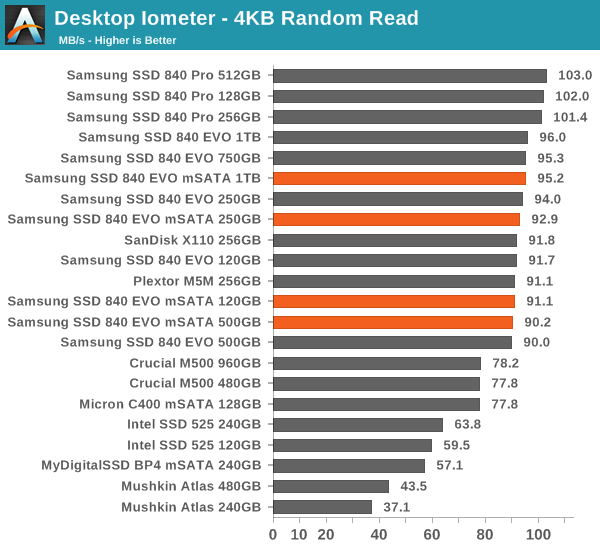
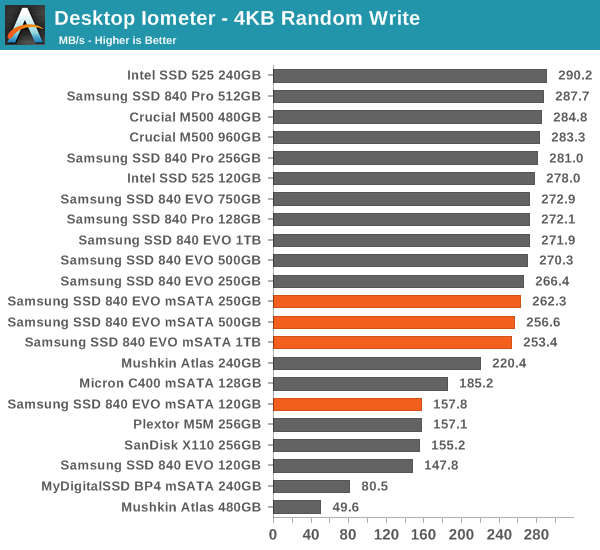
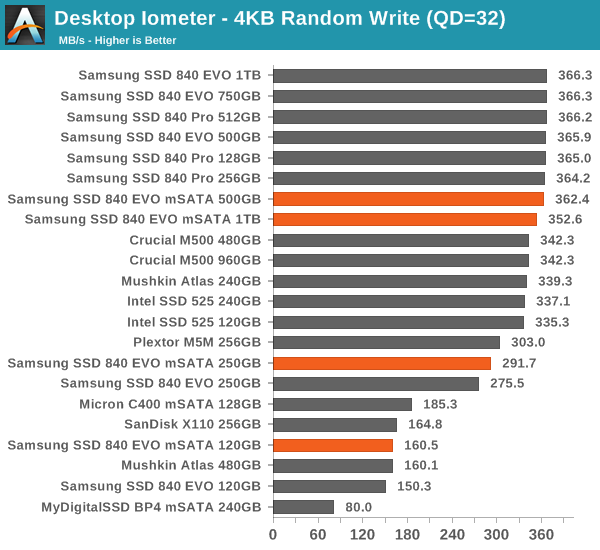
As expected, random IO performance is similar to the original EVO. There is some slight variation of course but nothing that stands out.
Sequential Read/Write Speed
To measure sequential performance I ran a 1 minute long 128KB sequential test over the entire span of the drive at a queue depth of 1. The results reported are in average MB/s over the entire test length.
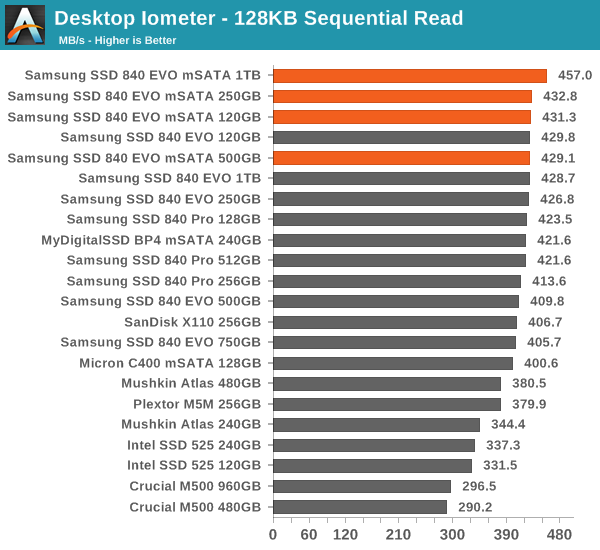
For some reason, the 1TB EVO mSATA is a few percent faster in 128KB sequential read test but falls short in the sequential write test. It's possible that the 16-die NAND has some effect on performance, which would explain the difference, but we're still dealing with rather small differences.
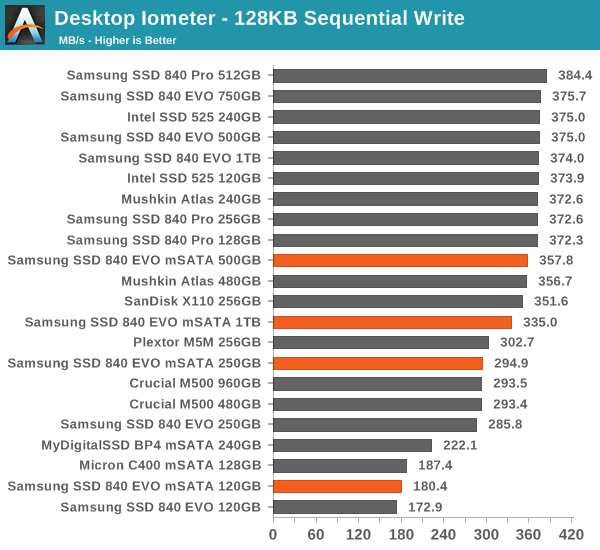
AS-SSD Incompressible Sequential Read/Write Performance
The AS-SSD sequential benchmark uses incompressible data for all of its transfers. The result is a pretty big reduction in sequential write speed on SandForce based controllers.
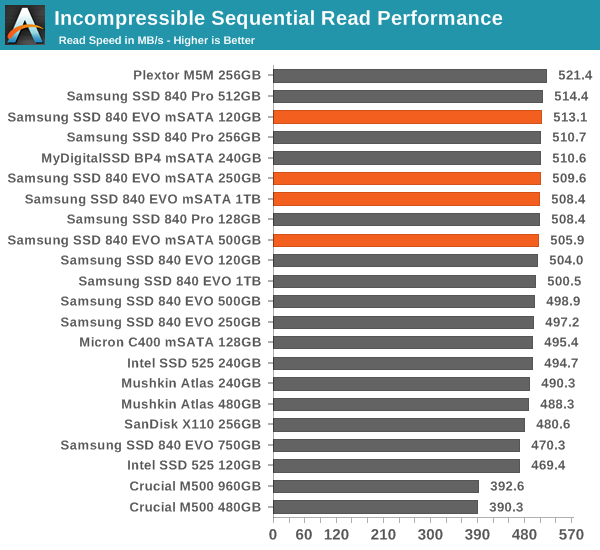
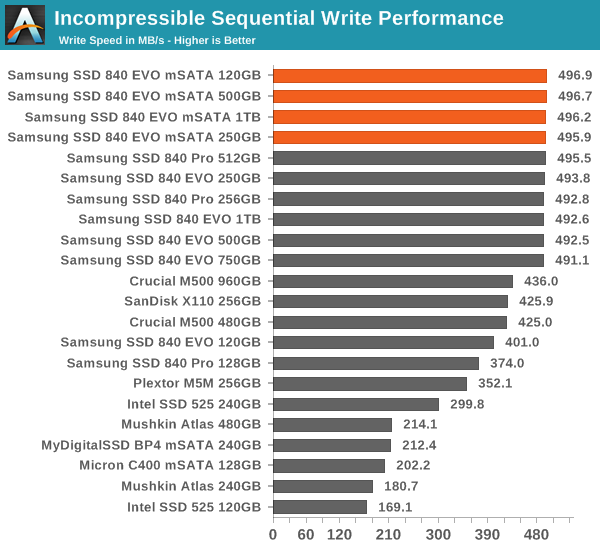










65 Comments
View All Comments
5mpx - Friday, January 10, 2014 - link
I recently picked up a Samsung 840 Pro 120GB for around $115 to replace the absolutely dreadful Samsung 1TB 5400RPM w/ 8GB SanDisk iSSD ExpressCache (which also seemed absolutely useless) on mainboard.Couldn't be happer - my Core i7 actually has to do some work now instead of sitting around waiting on the drive to feed it data.
dgingeri - Thursday, January 9, 2014 - link
I bet a ship from the future crashed in Seoul, and Samsung is out there reverse engineering technology from it to dominate the technology market. ;)Jarn - Thursday, January 9, 2014 - link
With these speeds, I just go with whichever of the seemingly most reliable brands are cheapest.BigAnvil - Friday, January 10, 2014 - link
Please, oh please, oh please, oh please... let someone make a miniature RAID box for mSata SSDs!!!!!!!!! Room for five mSata SSDs like this with striping and either a Thunderbolt 2 or USB 3.1 interface so we can all have multi-Gigabyte/sec transfer rates that can fit in ur shirt pocketses.Brenderick - Saturday, February 15, 2014 - link
http://www.mfactors.com/raid-card-msata/Not five, but it will cram a pair of them under a RAID controller into a 2.5 inch package. You could, in theory, RAID three of these together in a NAS and you would have what you are describing.
a1exh - Friday, January 10, 2014 - link
Samsung are not the only Vertically Integrated provider in consumer SSD space. Toshiba is also.Kristian Vättö - Friday, January 10, 2014 - link
Toshiba doesn't make their own controllers, they are just rebrands.Brenderick - Saturday, February 15, 2014 - link
Lacks controller IP.unclebump2013 - Friday, January 10, 2014 - link
it does exist. http://addonics.com/products/ad4mspx2.phpextide - Friday, January 10, 2014 - link
No, that's for mSATA, not M.2